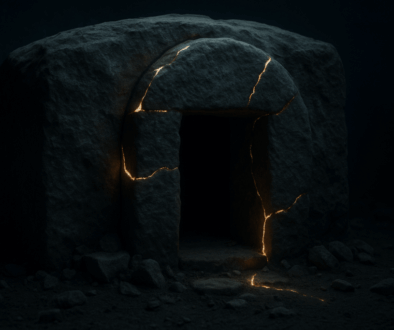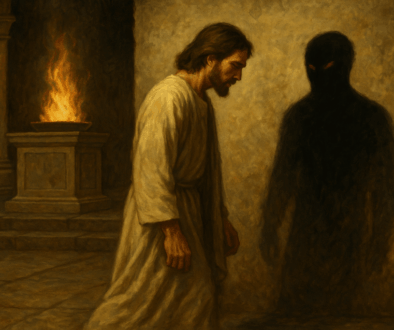Deep Calls to Deep: The Dialogue Between the Soul and God
Some Bible verses settle easily in the mind—simple, clear, easy to grasp.
Psalm 42:5–7 is not one of those verses. Instead, it demands contemplation rather than offering quick conclusions. It stirs something within, as if speaking from a deeper place—calling us to listen.
Prayer is the burden of a sigh,
The falling of a tear,
Outpouring of an eye.
When none but God are near.
These words echo the longing of Psalm 42:
Why are you cast down, O my soul, and why are you in turmoil within me?
Hope in God; for I shall again praise Him, my salvation and my God.
My soul is cast down within me; therefore I remember You from the land of Jordan and of Hermon, from Mount Mizar.
Deep calls to deep at the roar of Your waterfalls; all Your breakers and Your waves have gone over me.
What does it mean when deep calls to deep?
What deep is calling—and what deep is answering?
Could depth psychology help us unravel this mystery?
This passage draws us into a journey through the hidden places of the soul—from questioning our emotions to reaching toward Something greater—until we find ourselves submerged in the mysterious waters where human depth meets divine depth.
Let’s step into the deep and see where it takes us.
-
The First Step: A Conversation with Your Own Soul
The psalmist does something unexpected—he speaks directly to his own soul:
Why are you cast down, O my soul? And why are you in turmoil within me?
This is not passive despair—it’s active dialogue with himself. Rather than letting his emotions control him, he confronts them. This act of self questioning mirrors what psychology calls Active Imagination. Carl Jung described it as consciously engaging in dialogue with different parts of ourselves to bring unconscious material to light.
- Instead of suppressing emotions, we acknowledge and question them.
- Instead of being hijacked by moods, we bring them into the light of awareness.
- Instead of drowning in sorrow, we direct ourselves toward something greater.
The psalmist doesn’t pretend he isn’t suffering, but he also refuses to let suffering define him.
Instead, he faces his despair head-on, listening for what it has to say.
-
The Second Step: The Reality of the Depths
My soul is cast down within me; therefore I remember You from the land of Jordan and of Hermon, from Mount Mizar.
His soul is heavy, yet he makes a choice —to remember. This isn’t mere nostalgia; it’s an act of faith, a reaching out for a lifeline, grasping for something real. The mystical mirrors of memory shift and reflect, sometimes infinitely—calling us back.
- When we feel distant from God, the deep within us cries out for Him.
- When we feel lost in chaos, we search for structure that might hold us.
- When we feel alone in the deep, we remember —God’s creation began in chaos
This is not about denying pain; it’s about refusing to let pain write the ending.
-
The Third Step: Entering the Deep
And then comes one of the most striking and mysterious lines in Scripture:
“Deep calls to deep at the roar of Your waterfalls; all Your breakers and Your waves have gone over me.”
What does this mean?
- Deep calling to deep?
- Deep waters echoing one another?
- The depth within us calling to the depth of God?
The Deep as an Ancient Symbol
Across the Bible, mythology, and psychology, deep waters symbolize the unknown—the subconscious, the overwhelming, the mystery of the soul.
- Genesis 1:2 – Before creation, “darkness was over the face of the deep.”
- The Flood (Genesis 7–8) – Waters that cleanse and create space for a new beginning.
- Jonah 2:3–6 – Jonah descends into the deep but is brought back by God.
In modern psychology, water often represents the unconscious mind—the hidden thoughts, emotions, and memories below the surface.
So when the psalmist says “deep calls to deep,” it evokes a conversation—a profound dialogue between our hidden depths and the infinite depth of God.
-
The Inner Universe: Encountering Your Own Depths
Beneath our everyday consciousness lies a vast, uncharted world:
- A deep ocean within, its currents surging with emotional and spiritual energy.
- Strange creatures lurking below—memories, symbols, forgotten emotions.
- Voices rising from the depths—fear, hope, anger, longing—all competing for attention.
Anyone who has experienced:
- Vivid dreams,
- The fluid reality of childhood,
- A psychological crisis or an intense emotional shift,
…knows this deep world is real.
Far from mere fantasy, imagination can illuminate truths hidden beneath conscious thought.
We all sense it—this shifting landscape of the self:
- We talk to ourselves.
- We change depending on where we are, who we’re with.
- At times, an intense pocket of energy overtakes us—suddenly, we feel like someone else, ruled by anger, joy, grief, or peace.
We inhabit a layered existence, whether we acknowledge it or not.
This is why deep calls to deep:
Once you encounter your own depth, you need a greater depth to guide and transform it.
-
What Comes After the Deep? The Need for Divine Order
Stepping into your own depths reveals layers of memory, wounds, longings, and fears. But human depth alone can be overwhelming.
- Without something greater, the deep becomes an abyss instead of a path.
- Without God’s depth, our own depths risk feeling chaotic or meaningless.
We need a deeper, more stable presence to bring perspective and order.
This is where Wallace Clift’s insight bridges Jungian psychology and Christian faith:
“It is not a matter of making out each person a ‘God,’ but on the contrary, realizing that within each person lies the potentiality of responding to God by bringing that encounter into consciousness.”
In other words:
- The depth within you is real, but it is not the final truth.
- It is precisely where you become aware of a greater reality—God’s reality.
- God’s depth doesn’t erase yours; it transforms it.
-
An Invitation to Enter the Deep
Psalm 42:5–7 doesn’t preach escaping the deep—it invites us to step into it, to listen for God in the midst of turmoil.
Instead of running from our struggles, what if we engaged them openly—trusting that God is already there, waiting?
A Deep Listening Exercise
- Find a quiet place.
- Read Psalm 42:7 aloud: “Deep calls to deep at the roar of Your waterfalls…”
- Ask yourself:
- What deep part of me is calling right now?
- Have I been ignoring something within?
- What might God be saying in response?
- Write down what arises. Let your thoughts flow without judgment, like waves moving in and out.
Rather than fearing the deep, sit with its stillness.
Instead of fighting the waves, listen to what they are saying.
Deep calls to deep.
Will you listen?
Final Thought
Psalm 42:5–7 offers no quick solutions, but it does present a sacred pattern:
- Talk to your soul.
- Remember that God is near.
- Step into the deep—because the deep is where transformation happens.
In the end, the deep is not a terminus; it’s a meeting place where God joins us, and where something new can begin.
Psycheverse: “The Lord will fight for you; you need only to be still.”— Exodus 14:14



